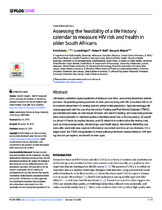| dc.contributor.author | Knight, Lucia C. | |
| dc.contributor.author | Schatz, Enid J. | |
| dc.contributor.author | Belli, Robert F. | |
| dc.date.accessioned | 2021-01-25T08:47:04Z | |
| dc.date.available | 2021-01-25T08:47:04Z | |
| dc.date.issued | 2020 | |
| dc.identifier.citation | Knight, L. C. et al. (2020). Assessing the feasibility of a life history calendar to measure HIV risk and health in older South Africans. PLoS ONE ,15(1),e0226024 | en_US |
| dc.identifier.issn | 1932-6203 | |
| dc.identifier.uri | 10.1371/journal.pone.0226024 | |
| dc.identifier.uri | http://hdl.handle.net/10566/5742 | |
| dc.description.abstract | Life history calendars capture patterns of behavior over time, uncovering transitions and trajectories. Despite the growing numbers of older persons living with HIV in southern Africa, little is known about how HIV testing and risk unfold in this population. Operationalizing a life course approach with the use of an innovative Testing and Risk History Calendar [TRHC], we collected pilot data on older South Africans’ risk and HIV testing. We found older persons were able to provide (1) reference points to facilitate recall over a 10-year period, (2) specifics about HIV tests during that decade, and (3) details that contextualize the testing data, such as living arrangements, relationships, and health status. Interviewer debriefing sessions after each interview captured information on context and links across domains. On a larger scale, the TRHC has potential to reveal pathways between sexual behavior, HIV testing and risk perception, and health at older ages. | en_US |
| dc.language.iso | en | en_US |
| dc.publisher | Public Library of Science | en_US |
| dc.subject | South Africans | en_US |
| dc.subject | HIV | en_US |
| dc.subject | Adult | en_US |
| dc.subject | Feasibility studies | en_US |
| dc.subject | Risk factors | en_US |
| dc.title | Assessing the feasibility of a life history calendar to measure HIV risk and health in older South Africans | en_US |
| dc.type | Article | en_US |

